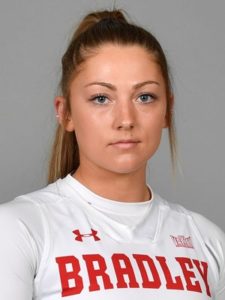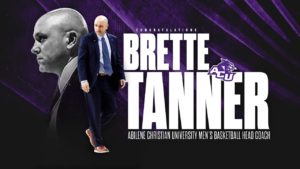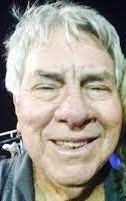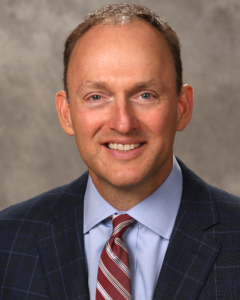We are keeping our fingers crossed in the hope that we can return to a “normal” version of college basketball this fall: fans in the stands, announcers without masks, etc. Nobody knows exactly what is going to happen but we will try to restore some order with season previews featuring the best players/coaches in the country. We continue our coverage with Bradley SR G Gabi Haack. HoopsHD’s Jon Teitel got to chat with Gabi about being named MVC Scholar-Athlete of the Year and her expectations for this season.
In 2018 as a freshman at Bradley you were named to the MVC All-Freshman Team: how were you able to come in and contribute right from the start? Coming into college I knew that it was going to be a big step up from high school with the pace/competition. I spent a lot of time getting in extra shots and doing workouts with my coaches. I made sure to work hard every practice and be patient for my time to play. The Western Illinois game is when it all clicked for me (in her 1st career start she scored a season-high 26 PTS and tied a school record with 8 3PM). From then on I was more confident in myself and was able to make a direct impact.
You set a school record as a junior by making 34 consecutive FTs: what is the key to being a great FT shooter? Being a great FT shooter is all about focus, confidence, and repetition. I make sure to practice my free throws when I am tired and put myself into game-like situations.
In the 2021 NCAA tourney you scored 16 PTS in a loss to Texas: where does WNBA 1st overall pick Charli Collier (23 PTS/15 REB) rank among the greatest players that you have ever faced? I have played against a lot of really good competition throughout my career. Charli is a very talented player and I am excited to follow her career in the WNBA.
Last season you won a ton of awards (including MVC Scholar-Athlete of Year/1st-Team All-MVC/MVC tourney MOP/Bradley Most Outstanding Female Athlete) and were also nominated for the NCAA Woman of the Year award in August: what did it mean to you to receive such outstanding honors? First of all, I am very honored to be recognized for those awards. I would not be the player I am without my coaches, teammates, and the support of my family. I am very thankful to be able to represent my university and be able to leave my mark at Bradley.
You are 40 PTS shy of breaking Karen Anderson’s school-record of 1679 career PTS and 12 3PM short of breaking Dayna Finch’s MVC record of 294 career 3PM: what is the secret to being a great scorer/3-PT shooter? The secret to being a great scorer and 3-PT shooter is my mindset. I know that I have to put in the extra time outside of practice/games if I want to be successful. I make sure to get up high volumes of shots at a fast pace. I also get in extra workouts with my coaches and work on my weaknesses. Another key to my success comes from strength and conditioning. Coach Matt Friend has helped me become stronger and faster, which directly impacts my ability to score.
You are the only player in the nation with 275 career 3PM/700 career REB: how do you balance these 2 very different aspects of your game? I spend a lot of time getting up high-volume shots at a fast pace and practicing game-like shots. Shots may not always fall but rebounding is a choice and is something that I can do no matter how I am performing.
Last summer you became the 1st woman ever to participate in Florida’s football strength and conditioning summer intern program: how did it go, and will we see you become a strength and conditioning coach in the future? This summer was mentally and physically the most challenging experience I have ever been a part of…but it was 100% worth it! I grew in so many ways and learned that being a strength and conditioning coach is what I want to do with my life after basketball. The UF Strength and Conditioning football coaches taught me so much and I am very thankful to have been the first woman to take part in the internship under that staff.
You have a 3.81 GPA as an elementary education major and are student-teaching this semester: how are you able to balance your work on the court with your work in the classroom? Time management. My parents taught me at a young age that school always comes before sports. I also have a lot of wonderful people and resources who have helped me during my time at Bradley.
Your father Dan was your basketball coach during elementary/junior high school and your sister Lydia plays D-2 basketball: how much of a role does the sport play in your family’s life? My family has always been involved in sports and we have always been a basketball family. My dad has coached all of my siblings: I remember going to Jordan, Lydia, and Carson’s basketball games when I was younger. Having my dad as my coach from kindergarten through 8th grade was very special. He taught me so much about the game and helped me develop many intangibles that can be used both on and off the court. Basketball has played a major role in my life and has given me many relationships/friendships that will last a lifetime. Basketball plays a major role in my family because it is something that we all enjoy and it brings us together.
What are your goals for this season, and what are your expectations for this season? My goal for this season is to hang another banner! I have the same expectations for this season that I did last year. We need to control what we can control and not take anything for granted.








